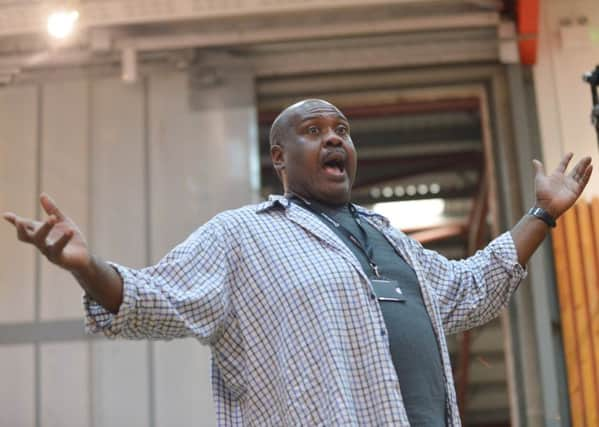Classical preview: Scottish Opera's Paisley Pagliacci to be 'more Glastonbury than Glyndebourne'


In truth, Bankes-Jones can only guess whether this week’s unconventional staging of Leoncavallo’s Pagliacci, which he is directing for Scottish Opera, will be an all-out success, given that it’s being performed in a massive tent in Seedhill Community Sports Ground in Paisley, by a 200-strong cast that is largely from the local community led by a team of Scottish Opera soloists, chorus and orchestra. But he’s sure of one thing; it will be like a day out at the fun fair.
Scottish Opera have promised us a “festival style” experience. “I think it’s more Glastonbury than Glyndebourne,” Bankes-Jones explains. “You want to get there early, because we have this huge tent filled with lots of stuff, like a Punch and Judy man, some handbell ringers and the chance to have a go at conducting the orchestra for one minute. All these things are there to inform your enjoyment of the opera, which starts an hour later.”
Advertisement
Hide AdSo why stick one of the sacred lollipops of 19th century Italian verismo opera in a whopping great tent? “That was Stratford’s choice,” he says, referring to Scottish Opera’s musical director, Stuart Stratford, who will conduct the performances. “I asked Stuart, why Pagliacci, and he said because of all the different levels of reality that exist in it. He is quite right. It’s a really good piece for blurring the distinction between performers and audience, or between professionals and amateurs.
Pagliacci – most often performed alongside Mascagni’s Cavelleria rusticana as the double bill “Cav and Pag” – plays on the heated confusion of its central travelling troupe and the perceived reality of the characters they represent in the opera’s play-within-a-play. So much so that things spiral way out of control for the troupe’s leader Canio (Pagliacci), who kills his wife Nedda in a fit of jealous rage.
Paisley audiences will be encouraged to feel part of that blurred reality, promises Banks-Jones. “The Chorus in the piece [made up of anyone from the Paisley community interested in attending rehearsals] are by and large an ‘audience’. That’s what it will seem like to the real audience, but then we immediately start playing games on what the reality is, and who is who.”
Banks-Jones has created his own new English translation for the Paisley production. He gives two reasons for this. “One, I didn’t really know the other translations. But more importantly, by creating something that is tailor-made for our specific situation, it’s very easy to bend things to what’s going on.”
When we spoke, initial rehearsals at Scottish Opera’s rehearsal studios in Glasgow were going well, but in a space a fifth the size of the tent. “That makes it quite hard to make the eventual transition to the tent. The ten days we eventually have in situ in Paisley will be critical.”
So what will opera gain from this wacky venue transplant from traditional opera theatre to recreational playing field?
Advertisement
Hide Ad“I hear lots of people saying it’s really worrying because opera is dying,” says the man who recalls, as a child, being dragged along to “excruciating” Gilbert and Sullivan, and a suburban opera society production of La bohème that “was the worst thing I’d ever seen”.
“These days I love it, ever since seeing David Putney’s production of [Janacek’s] The Macropoulos Case at English National Opera at the age of 17. But I don’t think it gets out enough. If you just sit in a bunker of your own making, watching endless reworkings of Carmen, it will look moribund. I do a thing in London each year where we do bits of opera in a bandstand on the street. You can’t buy a ticket, anyone walking past is welcome, there are no chandeliers, audiences absolutely lap it up. Nobody has said to them this is difficult new opera, so they just enjoy it for what it is.
Advertisement
Hide Ad“I don’t want to tear into the old ways of doing things, because I love them. I’ve done all this work on Pagliacci, translated it, and I believe in it hugely. But I think to keep opera alive you can’t just keep churning it out in a 19th century way. You need to complement that.”
And his advice to those coming to Paisley’s Pagliacci-in-the-park? “Come early; the earlier you come the more there is to devour!” n
Scottish Opera’s Pagliacci is at Seedhill Community Sports Ground, Paisley, 26-29 July, 0300 300 1210